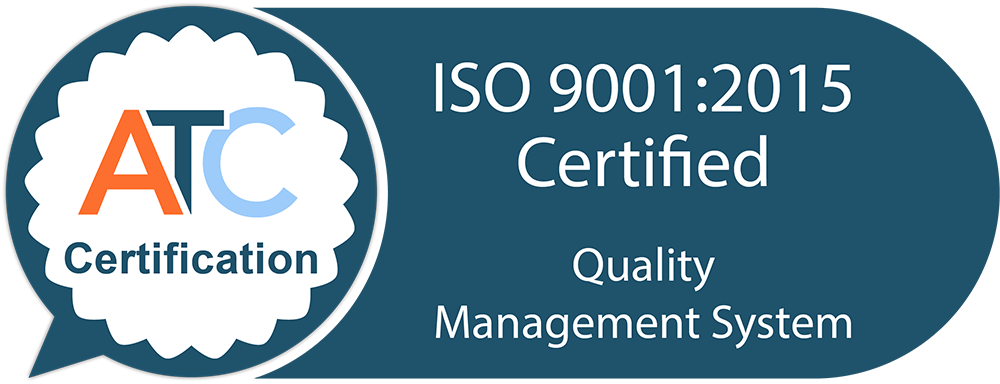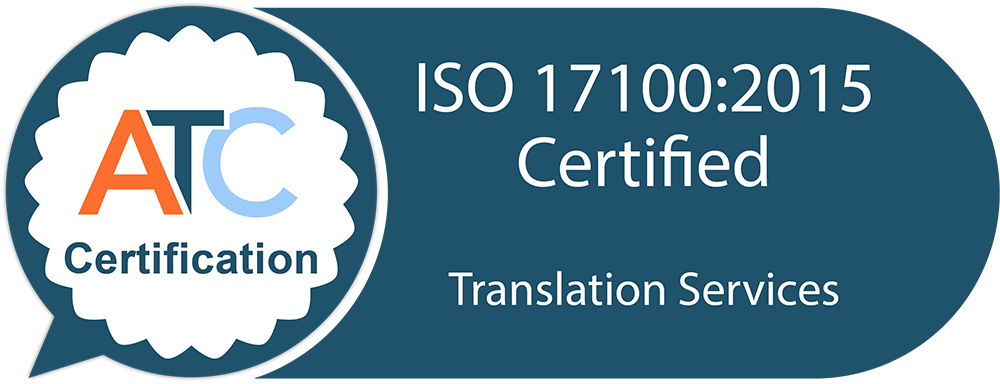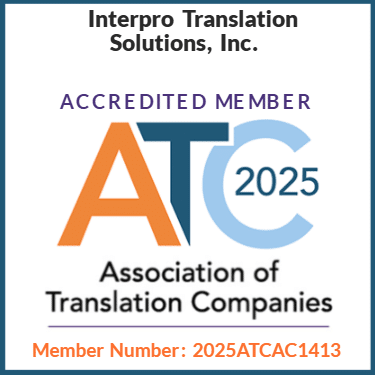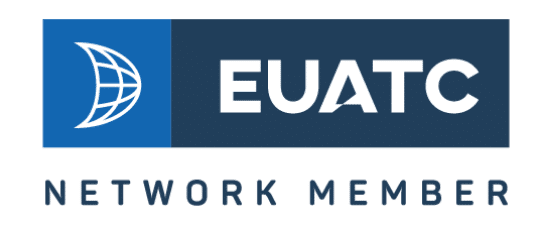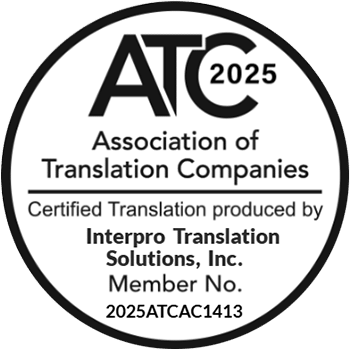ISO Certified Translation Services
Certified Translations
We offer ISO-certified translation services and certified translations to ensure the highest quality translations and client experience.
Certified Translation Services
Accurate, Certified Translation Services You Can Trust
At Interpro Translation Solutions, we provide certified translations that meet ISO 9001:2015 & ISO 17100:2015 standards. Whether you need legal, academic, or corporate document translations, we ensure accuracy, compliance, and confidentiality.
- ISO 9001:2015 & ISO 17100:2015 Certified Translation Services ensure accuracy, quality service, and compliance.
- Certified Translations offered through our accreditation with the Association of Translation Companies (ATC).
- Workmanship Guarantee that we will fix any errors in work that doesn't meet your scope requirements.


Certified Quality, Guaranteed Accuracy
Consistent, High Quality Translations You Can Count On
Certified translations require more than just linguistic accuracy. They demand subject matter expertise and quality assurance. Our ISO-certified processes ensure your content is translated flawlessly, so you can concentrate on crafting high-quality English content.


Quality Managed Language Services
Certified Translations, Regardless of Content Type
We provide translations that are officially certified through the Association of Translation Companies (ATC). This means our translations meet rigorous industry standards.
What does ATC Certification mean?
- The ATC is a specialist organization that certifies language service companies like ours.
- In 2024, Interpro became an Accredited Member of the ATC.
- This accreditation allows us to stamp our translations with the official ATC Certification.
Why is this important?
- A translation with the ATC stamp shows it was done by a trusted and verified company.
- Interpro passed a rigorous review by the ATC, including checks on our finances, quality, client references, and insurance coverage.
- This ensures you get accurate and reliable translations.

Anderson Design
“When we’ve needed things under tight deadlines, they have always accommodated. The staff at Interpro is top-notch and very professional.”
David Anderson
Owner
Association of Translation Companies
Quality You Can Trust: Our Commitment to ISO Standards
Interpro’s ISO certifications not only reinforce our dedication to continual improvement, but also foster a culture of problem-solving, responsiveness, and client satisfaction, to the benefit of both our company and yours.
Attaining and maintaining our ISO certifications demonstrates our commitment to:
- Consistently delivering exceptional quality for every service we provide
- Increasing the efficiency and cost-effectiveness of our processes
- Building strong relationships with our partners
- Monitoring our performance and identifying areas for improvement
- Increasing customer satisfaction and confidence in our team and our services
Quality Management Systems
ISO 9001 is a globally-recognized standard for Quality Management Systems (QMS) that helps organizations consistently provide products and services that meet customer and regulatory requirements, while promoting continual improvement.
Translation Services
ISO 17100 is an international standard that sets requirements for translation services, ensuring quality and consistency in the translation process by focusing on core processes, resources, and other aspects necessary for delivering a quality translation service.
Certified Translation FAQs
Learn about certified translation FAQs and their importance, requirements, specific use cases, the roles of certified translators, how to identify certified translation services, and the risks of non-certified services.
A certified translation is one that has been done by a professional translator or agency that is certified by a recognized professional body or association and is accompanied by a signed and digitally stamped statement affirming that the translation is a true and accurate representation of the original source language content.
Translations certified with this stamp show that the translation has been executed by an Accredited Member of the Association of Translation Companies. It demonstrates the company has passed the ATC’s strict membership vetting process, including audits on financial stability, quality management processes, client and supplier references, and also carries appropriate professional indemnity insurance.
As Interpro holds two ISO certifications and is an Accredited Member of the ATC, we can provide Certified Translation Services for any project and any language.
Learn more about our Certified Translation Services for any project and any language.
Certified translations are often required for official purposes, including legal documents, academic transcripts, and business contracts. They offer official validation that the translation is accurate and authentic.
A few specific examples:
- Legal Document Translation: Contracts, court orders, affidavits, and patents may need to be translated for legal proceedings or submission to government agencies, or documents that ensure that all parties involved can rely on the accuracy of the translated documents.
- Official Business Documents: Companies often require proof of accuracy of business contracts, financial statements, patents, and other corporate documents for international transactions, partnerships, or regulatory compliance.
A certified translation includes a signed statement verifying its accuracy for official use, while a normal translation is used for general purposes without formal certification.
At Interpro, this means:
A certified translation includes a signed statement attesting that the translation is accurate and complete to the best of our knowledge. This certification is often required for official purposes such as immigration, legal proceedings, academic applications, and government documentation.
A normal translation, while still accurate and professionally completed, does not include this formal certification. It’s typically used for internal business documents, marketing materials, or general communication where legal validation is not needed.
Official translation usually means the translation needs to be completed by a registered professional translator or professional translation company. A translation that is certified is a step up from official translation.
Some end users of certified translations may request or require that “the translation be notarized.” This is actually a misnomer as the translation cannot be notarized. A notary public only legally acknowledges the identity of the individual signing the certification statement. While the terminology is inaccurate, it is helpful to know that this is commonly used by end users and clients.
At Interpro, all of our translations are certified, eliminating the need for notarization and ensuring your documents meet official requirements with less hassle.
To determine if a translation agency is certified, you can consider the following steps.
- Check their credentials and accreditation;
- Evaluate industry experience by vetting their reputation and specialization.
By following these steps and conducting due diligence, you can determine whether a translation agency is certified and capable of providing high-quality, accurate translations.
The rules can vary depending on the country, industry, and specific requirements of the document being translated. However, some general principles and guidelines apply to ensure that translations meet established standards of accuracy, authenticity, and reliability.
- Accuracy. Certified translators must ensure that the translated text accurately reflects the content of the original document. This includes conveying the meaning, tone, and intent of the original text while adhering to the grammatical rules and conventions of the target language.
- Completeness. Documents should include all the information contained in the original document without omitting or altering any content. Translators must translate all text, including headings, footnotes, signatures, and any other relevant information.
- Authentication. In some cases, the translation may require additional authentication to validate the certification statement. This can involve having the translator’s signature notarized by a licensed notary public.
- Quality Assurance. A translation service often has processes in place to review and verify the accuracy and quality of the translations before certification. This may include proofreading, editing, and review by a second translator to ensure consistency and accuracy.
Yes, our translations meet global certification standards and are accepted by government institutions.
Actual project duration varies and depends on a variety of factors, including languages being translated, number of words, and file formats. Additional time may be required for desktop publishing, graphics localization, voice over recording, online validation, engineering processes, and final pre-delivery QA. Expectations concerning cost, and delivery parameters are specified at the quotation stage of your project.
Still have questions?
We're here to help you with any inquiries.
Put the best language translation company to work for you
Ready to see how our solutions can drive exceptional ROI for your language translation needs?
Schedule a free consultation today to discuss your specific goals and explore how we can help you achieve them.


